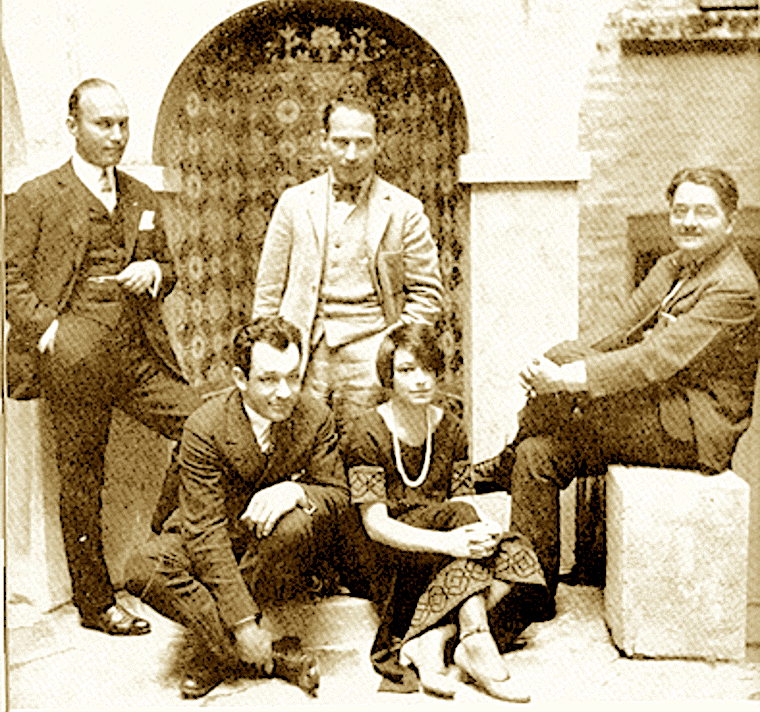The Algonquin Round Table
Special to the Newsletter
by Michael F. Bishop
The Algonquin Round Table, often romanticized as the pinnacle of 1920s New York wit, was a daily luncheon gathering of writers, critics, actors, and hangers-on who met at a large table in the Rose Room of the Algonquin Hotel on West 44th Street. From roughly 1919 to 1929, this collective produced some of the era’s sharpest prose, cruelest bon mots, and most enduring literary friendships—along with a fair share of professional jealousies.

The group formed in June 1919, in the wake of the Great War. Alexander Woollcott, then drama critic for The New York Times, had just returned from France, where he had served as a correspondent. To roast him for his self-importance, a clutch of theater press agents and columnists threw a mock “welcome home” lunch at the Algonquin. The hotel’s owner, Frank Case, a former vaudevillian with a soft spot for writers, seated them at a central table and kept the coffee coming. Woollcott, rather than taking offense, declared the party a triumph and insisted it continue daily. The hotel, struggling financially after the war, suddenly had a built-in publicity machine.
Membership was fluid, but the core dozen or so regulars included Dorothy Parker, whose poison-pen couplets and short stories distilled heartbreak into aphorisms (“Men seldom make passes / At girls who wear glasses”); Robert Benchley, the humorist and New Yorker drama editor whose mock resignation letters (“I am leaving tomorrow afternoon”) became office legend; Robert E. Sherwood, the towering playwright who later won four Pulitzers but began as a film critic for Life magazine; Harpo Marx, the silent Marx Brother, who communicated in pantomime and occasional honks of his taxi horn; Harold Ross, who used the Table as a talent incubator for the magazine he founded in 1925, The New Yorker; and several other regulars.
Others drifted in and out: Tallulah Bankhead, Noël Coward, Jascha Heifetz, even the occasional mayor or bootlegger. The only consistent requirement was the ability to deliver—or withstand—a lacerating one-liner.
Lunch began at 1:00 p.m. sharp. Frank Case reserved the table indefinitely and ran a tab that members settled (or didn’t) at month’s end. The menu featured club sandwiches, Welsh rarebit, and apple pie à la mode. Conversation ranged from Broadway gossip to socialist theory to merciless parody. A favorite game was “I can give you a sentence,” in which the players were given a word and asked to make a sentence out of it. Presented with “horticulture,” Parker replied, “You can lead a horticulture, but you can’t make her think.”
The Table’s influence extended far beyond the dining room. Parker’s first short story collection, Laments for the Living (1930), grew directly from Rose Room anecdotes. Benchley’s film shorts for Fox—starting with “The Treasurer’s Report” (1928)—originated as after-dinner monologues. Ross recruited Parker and others for The New Yorker, ensuring the magazine’s tone of sophisticated irreverence.
Yet the glamour masked fractures. Woollcott’s ego alienated even allies; a friend once wired him, “Sorry unable to attend your birthday. Will attend your funeral.” Parker’s alcoholism and suicide attempts darkened the table’s later years. By 1927, marriages were collapsing, livers failing, and the stock market’s roar drowned out epigrams. When the crash came in 1929, many regulars scattered—some to Hollywood, others to Europe, a few to sanatoriums. The Algonquin tried to institutionalize the legend. In 1930, Case installed a literal Round Table (actually oval) in the Oak Room and invited surviving members for anniversary photos. Parker refused to attend, dismissing it as “a wake for something that died of old age.”
The real legacy is literary and cultural. Read Parker’s “Big Blonde” (1929) and you hear the echoes of the Table. To open The New Yorker today is to be reminded of Ross’s original prospectus, scribbled on Algonquin stationery: “not edited for the old lady in Dubuque.” Their most memorable group creation was No Sirree! a theatre revue in 1922 featuring silly songs and off-color humor.
Last year, after a six-month restoration, the original table was returned to its proper place; visitors can gather around it and recall the sparkling (and sometimes vulgar) exchanges from a century ago.
Michael F. Bishop, a writer and historian, is the former executive director of the International Churchill Society and the Abraham Lincoln Bicentennial Commission.




